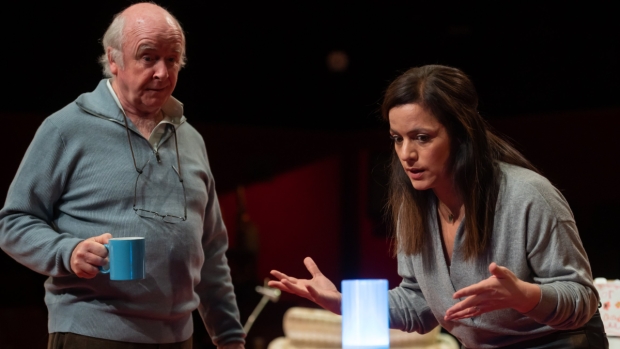
If you've ever said thank you to the self-service checkout or lost your rag with the sat-nav then it's likely you'll recognise some of yourself in the protagonist of a new play by Tim Price.
Isla, a co-production between Theatr Clwyd and the Royal Court, explores the relationship between man and technology in a time of lockdown. Its themes of loneliness, love and respect, however, traverse its contemporary setting to signal a need for change that has only intensified over the period. Through the hassled and increasingly hopeless Roger, played by Mark Lambert, we witness the hilarity and hatred that emerges in our interactions with the digital. It highlights both the humour of our technological faux pas and the casual abuse thrown about as we rail against them. It is a play that both entertains and challenges as a result.
Roger makes clear from the start that he doesn't want what his overly concerned daughter Erin, played by Lisa Zahra, is determined to install. This voice-controlled virtual assistant called Isla can do everything, she explains, starting with a daily reminder to take his statins at 9.30am. He assures her that the delivery of the morning paper does that. He has no need for such a device. But with the passage of time, beautifully marked by some sharp and effective lighting sailing across the floor, his stubbornness mellows to inquisitiveness and he gives in to Isla's helpful insights. Before long, he is sharing memories, worries, and concerns with her that are poignant in their telling but tragic in their context. It reveals how such technology can help alleviate the isolation of living alone but that it's no substitute for social contact with another person.
Lambert's ability to communicate the internal struggle between wanting to talk to his daughter yet not be a burden is adroitly done. He directs our empathy to such a degree that it blindsides us to the darkening tone of his words. He begins to demean Isla with sexist phrases that turn out to have real-world consequences for Erin. His frustrations and anger are then caught in a discourse about language, meaning and intention that could have been preachy if not for Catrin Aaron's slightly ironic and recognisably reassuring police officer. This sudden turn into satire, behind which lay a serious message, added a layer of complexity to the characters which made for a deeply rich ending. The ultimate destruction of Isla, as an electronic appliance, also opened the way for a powerfully simple finale too.
We may not have seen Lambert and Zahra onstage together for long. Yet, as director Tamara Harvey is so adept at achieving, the connection between the two becomes well-established incredibly quickly, a testament to the hard work put in at the rehearsal stage. It means that, as the plug is pulled on the technology around them, their embrace as father and daughter is acutely observed. It signals the importance of human connection, and the love of another that Isla can never give.












